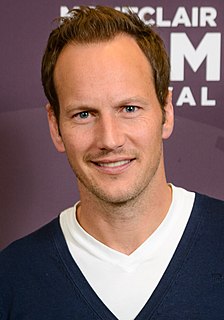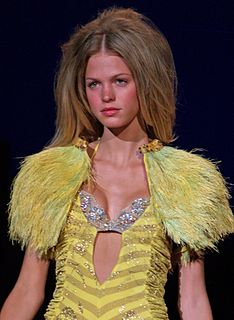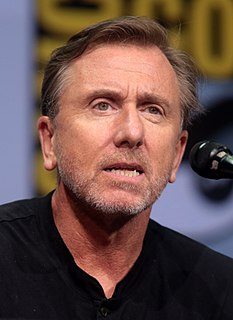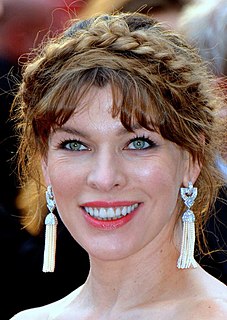A Quote by Patrick Wilson
When I look at a character, whether he's good or bad, one scene or 10 scenes, I just have to find my way in.
Related Quotes
Whether it's one scene or 15 scenes in a film, whether it's the lead or a cameo part, if I don't find it interesting, I tend not to do it. You never really know what it is. It could be a one-scene part. I remember I read the one scene in Crash and was asked to do it. I was like, "Absolutely!" There's no formula for how something has to be. I always try to keep it that way.
I’m not perfect. I never identified with the way I look; I was just born this way. I don’t feel rejection if I’m not the right person for a job, because that’s not where I find my self-worth. I’m a beautiful person, and that’s not because of my modeling career. There are good shots, and there are bad shots, but it’s just like playing a character. If you think of the top five people that you care about the most in your life, you probably don’t care if they look good in every angle or photo.
When it comes to partisan politics, everyone is a hypocrite. And all they care about is whether it hurts or helps them ... Is it good or bad for the Democrats? Is it good or bad for the Republicans? Is it good or bad for Jews, or good or bad for blacks, or is it good or bad for women? Is it good or bad for men? Is it good or bad for gays? That's the way people think about issues today. There is very little discussion of enduring principles.
I love Kimberly Peirce. Incredibly intense is a good way of describing her. Brutally honest. Really sharp. She's a director for actors. That's what she's best at, sitting down with an actor and just getting to the heart of what a scene is. And getting to the heart of not just what the scene is and the character is, but what you are, and how to build that bridge between the "me" and the character, and those emotions.
When something arrives, you have no idea what's in it, which is good. And then, it's is the story leaps off the page at you and how your character functions within it. There could be just one scene and if it's wonderful, it doesn't matter how much you're working on it because you just want to be in it. It's really about what your character's day to day world looks like, and if you feel like that's something that's complete, and that you'd like to inhabit for awhile. You'll know by a couple of scenes in. If the character grabs you, you run with it.
For me, in movies, it's always a mixed bag. I've never made a movie where I thought, "You were really good in that movie; you were good all the time." No. It's always, "You didn't get it, you didn't do it in that scene, but the other scene is pretty good." So I just hope that in balance there's more good scenes than not.
When I first started writing, there was no way I'd write a sex scene. That just seemed impossible. That's why in "Fight Club" all the sex happens off-screen. It's all just a noise on the other side of the wall or the ceiling. I just couldn't bring to write in a scene like that. So one of the challenges with "Choke" was I wanted to write sex scenes until I was really comfortable just writing them in a very mechanical way.
That's exactly the way parents develop positive, successful kids. Don't look for the flaws, warts, and blemishes. Look for the gold, not for the dirt; the good, not the bad. Look for the positive aspects of life. Like everything else, the more good qualities we look for in our children, the more good qualities we are going to find.
Sometimes I'll have a scene that strikes me, I just feel like writing a scene, a mini-story that seems like it might lead somewhere. But that is such a tentative, fishing-hook way to go about it that these days I've found it's easier to kind of at least have your concept and start attaching things to a skeleton. So I try to find the armature, the kind of backbone of it first that you can start to hang those scenes on.




































